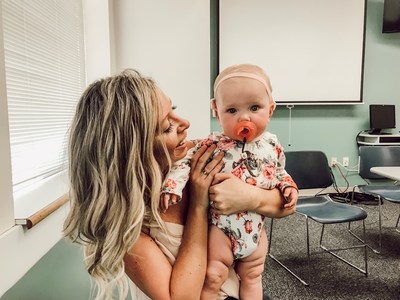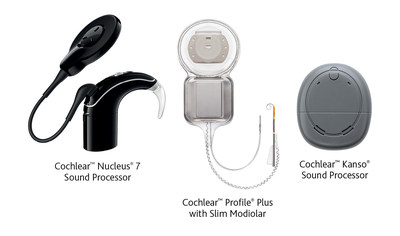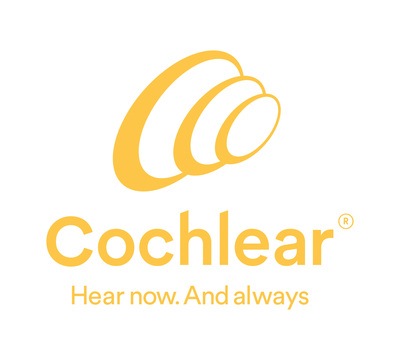Cochlear received FDA approval to lower the age of implantation at the beginning of COVID-19 crisis; earlier access to cochlear implantation for children provides opportunity for better hearing, speech and language outcomes in children born deaf
Cochlear received FDA approval to lower the age of implantation at the beginning of COVID-19 crisis; earlier access to cochlear implantation for children provides opportunity for better hearing, speech and language outcomes in children born deaf
LONE TREE, Colo., May 19, 2020 /PRNewswire/ -- Cochlear Limited (ASX: COH), the global leader in implantable hearing solutions, obtained U.S. Food and Drug Administration (FDA) approval on March 17 to lower the age of cochlear implantation from 12 months to 9 months for children with bilateral, profound sensorineural hearing loss. This important approval ensures children born deaf have earlier access to a cochlear implant which can provide them with the hearing capabilities to develop speech and language at a trajectory similar to their hearing peers. Ensuring children have access to sound as early as possible should be prioritized as surgeries begin resuming across the country due to the COVID-19 pandemic.
Cochlear implants have been FDA approved for use in children since 1990 with CochlearTM Nucleus® Implants obtaining the first approval. Decades of research and current surgical and clinical practice underscore the efficacy of earlier implantation to achieve their personal best language and speech outcomes.1-13 The research and support in practice by trained hearing health professionals provided the foundation to approve the indication be lowered to 9 months, along with the considerable developments in technology and evolving speech coding strategies in modern day cochlear implant devices.
"In light of all that has happened, access to hearing and hearing healthcare is more important now than ever. Hearing connects us to people and access to sound for those with hearing loss is important for connection as we continue to socially distance ourselves to mitigate this virus," said Dr. Jace Wolfe, PhD, CCC-A, Chief of Audiology & Research, Hearts for Hearing. "For children especially, having access to sound during the important language development stages is critical. We know for children born with profound hearing loss, the earlier they receive cochlear implants, the greater their opportunity for success with hearing, speech and language."
According to the American Academy of Pediatrics, an estimated three in 1,000 infants are born in the U.S. each year with moderate, severe or profound hearing loss.14 Additionally, hearing loss is the most common congenital condition in the U.S.14 Hearing loss has a major impact on a child's life, including speech and language development, literacy, mental health, social and cognitive functioning, educational achievement, employment and socio-economic opportunity.3 Research shows that children with a severe-to-profound hearing loss who receive cochlear implants early achieve better speech recognition than children who continue to use hearing aids, underscoring the importance to not delay access to cochlear implants because doing so can have lingering developmental consequences.3,4
"As states begin to allow more surgeries, we hope this expanded indication will help hospitals to prioritize pediatric cochlear implant surgeries. Our hopes are that children get access to hearing technology that will help them obtain age-appropriate speech and language as soon as they can," said Patricia Trautwein, MA, AuD, Vice President, Product Management & Marketing, Cochlear Americas.
While many early intervention factors contribute to a child succeeding with a cochlear implant, cochlear implants provide improved: auditory awareness of sounds at levels within the normal range of hearing15; speech understanding, sound clarity and language skills15; hearing in noise16; quality of life16; and educational outcomes.17 Up to 80 percent of children who received cochlear implants younger than 12 months of age demonstrate receptive vocabulary knowledge within the normal range by school entry, and 81 percent of children who receive cochlear implants early attend mainstream schools.13,18
"When we got the news that our daughter failed her newborn hearing screening and was diagnosed with profound hearing loss at birth, it gutted us. We had never met a deaf person before our daughter and did not know what life would look like raising a child with hearing loss," said Christy Keane, mother to Nucleus Cochlear Implant recipient, Charly, and social media influencer focused on motherhood and children with hearing loss. "Thankfully, we had an amazing care team who helped us understand all of the possibilities on this journey, and we decided to have Charly implanted at 10 months of age. Now, nearly 3 years old, Charly receives speech therapy every day, previously in school but now virtually, and we work together at home on her listening and language skills. Thanks to all the early intervention factors we provided her, Charly is on track developmentally and we're so excited to see what her future will bring."
In the U.S., the Cochlear Nucleus Implant System is intended for use in children 9 to 24 months of age who have bilateral profound sensorineural deafness and demonstrate limited benefit from appropriate binaural hearing aids. Children 2 years of age or older may demonstrate severe to profound hearing loss bilaterally.* This FDA approval is extended to all current Cochlear Nucleus Implant models, as well as all models developed in the future by Cochlear. Cochlear implants are typically covered for children by Medicaid and most insurance plans.** For more information on implantable hearing solutions for children with hearing loss, visit IWantYouToHear.com. For more clinical information on the longitudinal outcomes of cochlear implantation for children with hearing impairment, visit: www.outcomes.nal.gov.au/key-findings.
About Cochlear Limited (ASX: COH)
Cochlear is the global leader in implantable hearing solutions. The company has a global workforce of more than 4,000 people and invests more than AUD$180 million each year in research and development. Products include cochlear implants, bone conduction implants and acoustic implants, which healthcare professionals use to treat a range of moderate to profound types of hearing loss.
Since 1981, Cochlear has provided more than 600,000 implantable devices, helping people of all ages, in more than 180 countries, to hear.
References
- Waltzman SB, Roland JT Jr. Cochlear implantation in children younger than 12 months. Pediatrics. 2005; 116(4): 487-493.
- Cuda D, Murri A, Guerzoni L, Fabrizi E, Mariani V. Pre-school children have better spoken language when early implanted. Int J Pediatr Otorhinolaryngol. 2014; 78(8):1327-1331.
- Ching T, Dillon H, Marmane V, Hou S, Day J, Seeto M, Crowe K, Street L, Thomson J, Van Buynder P, Zhang V, Wong A, Burns L, Flynn C, Cupples L, Cowan R, Leigh G, Sjahalam-King J and Yeh A. Outcomes of early-and late-identified children at 3 years of age: Findings from a prospective population-based study. Ear Hear. 2013; 34(5): 535-552.
- Leigh J, Dettman S, Dowell R. Evidence-based guidelines for recommending cochlear implantation for young children: Audiological criteria and optimizing age at implantation. Int J Aud 2016; 55:S9-S18.
- Cosetti M and Roland J. Cochlear implantation in the very young child: issues unique to the under-1 population. Trends Amplif. 2010 Mar; 14(1): 46-57.
- Holt R and Svirsky M. An exploratory look at pediatric cochlear implantation: is earliest always best? Ear Hear. 2008 Aug; 29(4):492-511.
- Roland J, Cosetti M, Wang K, Immerman S, Waltzman S. Cochlear implantation in the very young child: Long-term safety and efficacy. Laryngoscope. 2009; 119(11): 2205-2210.
- Holman MA, Carlson ML, Driscoll CL, Grim KJ, Peterson RS, Sladen DP, Flick RP. Cochlear implantation in children 12 months of age and younger. Otol Neurotol. 2013; 34(2):251-258.
- Dettman SJ, Pinder D, Briggs RJ, Dowell RC, Leigh JR. Communication development in children who receive the cochlear implant younger than 12 months: Risks versus benefits. Ear Hear. 2007; 28(2 Suppl):11S-18S.
- Ching TY, Dillon H, Day J, Crowe K, Close L, Chisholm K, Hopkins T. Early language outcomes of children with cochlear implants: interim findings of the NAL study on longitudinal outcomes of children with hearing impairment. Cochlear Implants Int. 2009;10 Suppl 1:2832.
- Colletti L. Long-term follow-up of infants (4-11 months) fitted with cochlear implants. Acta Otolaryngol. 2009 Apr; 129(4):361-6.
- Nicholas J and Geers, A. Spoken language benefits of extending cochlear implant candidacy below 12 months of age. Otol Neurotol. 2013; 34:532-538.
- Dettman SJ, Dowell RC, Choo D, Arnott W, Abrahams Y, Davis A, Dornan D, Leigh J, Constantinescu G, Cowan R, Briggs RJ. Long-term communication outcomes for children receiving cochlear implants younger than 12 months: A multicenter study. Otol Neurotol. 2016 Feb; 37(2): e82-95.
- Program to Enhance the Health & Development of Infants and Children (PEHDIC) [Internet]. American Academy of Pediatrics; c2020 [cited 10 Feb 2020]. Available from: https://www.aap.org/en-us/advocacy-and-policy/aap-health-initiatives/PEHDIC/Pages/Early-Hearing-Detection-and-Intervention.aspx.
- Novak MA, Firszt JB, Rotz LA, et al. Cochlear implants in infants and toddlers. Ann Otol Rhino Laryngol Suppl 2000;185:46-49.
- Hirschfelder A, Gräbel S, Olze H. The impact of cochlear implantation on quality of life: The role of audiologic performance and variables. Otolaryngol Head Neck Surg. 2008 Mar;138(3): 357-362.
- Wyatt JR, Niparko JK, Rothman M, deLissovoy G. Cost Utility of the Multichannel Cochlear Implant in 258 Profoundly Deaf Individuals. Laryngoscope.1996;106:816–821.
- Semenov, YR, Yeh, ST, Seshamani, M, Wang, N-Y, Tobey, EA, Eisenberg, LS, Quittner, AL, Frick, KD, Niparko, JK, CDaCI Investigative Team. Age-Dependent Cost-Utility of Pediatric Cochlear Implantation. Ear Hear. 2013;34(4):402-412.
* In the United States, the cochlear implant system is intended for use in children 9 to 24 months of age who have bilateral profound sensorineural deafness and demonstrate limited benefit from appropriate binaural hearing aids. Children 2 years of age or older may demonstrate severe to profound hearing loss bilaterally. In Canada, the cochlear implant system is intended for use in children 12 to 24 months of age who have bilateral profound sensorineural deafness and demonstrate limited benefit from appropriate binaural hearing aids. Children 2 years of age or older may demonstrate severe to profound hearing loss bilaterally.
** Payer coverage policies may not align with new indications. Exceptions for coverage should be sought through the prior authorization process. Contact your insurance company or local Hearing Implant Specialist to determine your eligibility for coverage.
Please seek advice from your health professional about treatments for hearing loss. Outcomes may vary, and your health professional will advise you about the factors which could affect your outcome. Always read the instructions for use. Not all products are available in all countries. Please contact your local Cochlear representative for product information. Views expressed are those of the individual. Consult your health professional to determine if you are a candidate for Cochlear technology.
© Cochlear Limited 2020. All rights reserved. Hear now. And always and other trademarks and registered trademarks are the property of Cochlear Limited or Cochlear Bone Anchored Solutions AB.
![]() View original content to download multimedia:http://www.prnewswire.com/news-releases/as-surgeries-resume-pediatric-cochlear-implantation-can-now-be-done-as-young-as-9-months-301060328.html
View original content to download multimedia:http://www.prnewswire.com/news-releases/as-surgeries-resume-pediatric-cochlear-implantation-can-now-be-done-as-young-as-9-months-301060328.html
SOURCE Cochlear Limited
Company Codes: Australia:COH, OTC-PINK:CHEOY







